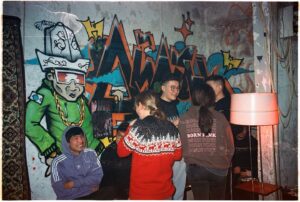Hip hop, which appeared in America in the 1970s, has long since become a worldwide phenomenon adapting and evolving in each new environment. Central Asia is no exception, as a quick overview of rap music from the region reveals.
This article was originally published on Novastan’s German website in 2018.
According to Spotify, hip hop is the most popular music genre in the world. Although most of Central Asia is not yet covered by the Swedish streaming service, it does have very active and increasingly professional rap scenes. Some of these even enjoy great commercial success.
This is especially true for Kazakhstan, home to the largest music industry in the region. Kyrgyz rap has equally found its way to the forefront of local pop culture. In Uzbekistan, Tajikistan and Turkmenistan, state control over the cultural sector is stronger, pushing local rap scenes either into conformity or to the margins.
Want more Central Asia in your inbox? Subscribe to our newsletter here.
Central Asia’s widespread multilingualism is reflected in its rap. Russian-speaking artists still have the largest audience, yet most Central Asian rappers favour their national languages. But Central Asia’s rap scenes also differ in terms of their themes and social setting.
As an entry point, here are ten remarkable songs from all five Central Asian countries.
1. Skriptonit – Style (Kazakhstan/Russia, 2015)
“One brother to my left, one to my right, I don’t call this “koresh” [Russian slang for a close friend] – because I’m from Pavlodar, if you remember”
With his atmospheric flow and lyrics from the world of a small town in northern Kazakhstan, Skriptonit – a stage name for the 27-year-old Ádil Jálelov – has long been one of the most popular rappers in Russia. But he likes to call his music “Kazakhstan rap”: “I am lucky that I come from Kazakhstan. I had little to do with Russian rappers and I don’t echo them,” he said in an interview with Russian journalist Ksenia Sobchak.
Skriptonit’s texts revolve around his experiences as a child and teenager in Kazakhstan’s Northern Pavlodar region. In Styl’, from his first album Dom s normalnimi yavleniyamy (“House of Normal Appearances”, an allusion to the Russian title of the US film A haunted House), he offers a portrait of his neighbourhood, “stinking of grass mixed with Hugo [Hugo Boss perfume]”.
Skriptonit achieved his breakthrough in 2013 with VBVVCTND (short for “Choice without options, all you gave us”). The words “look into the television, there you are like Alice in Wonderland” could be the song’s slogan. By signing a contract with the Russian label Gazgolder and moving to Moscow, he managed to jump down the rabbit hole.
2. Baller – Armandar oryndalady (Kazakhstan, 2017)
“Dreams come true, if the goal is clear, if you have patience and faith”
If Skriptonit represents North Kazakh rap, Baller stands for the Southern side, or Shymside, as he would say himself. The 24-year-old artist comes from Shymkent, dubbed the “Texas of Kazakhstan” by Texas Monthly. His career began in 2008 when he became a member of the Shymkent label 11-Block. Unsurprisingly, one of his early pieces is dedicated to his hometown.
Baller raps mostly in Kazakh but also plays with Russian and English vocabulary in his lyrics, using the code-switching that is already common in rap. Today, he is one of the most popular rappers in Kazakhstan and even won the prize for best hip hop project at the Eurasian Music Awards 2017. Dreams come true, as he titled this song.
3. Zamanbap – Ene Til (Kyrgyzstan, 2015)
“This piece belongs to me, to my mother, to all who understand it, to you…”
Two years ago, the Bishkek group Zamanbap (“Modern” in Kyrgyz) landed a minor hit with Ene til (“Mother tongue”), an ode to the Kyrgyz language. The three rappers Begish, Bayastan and Casper merge traditional Kyrgyz motifs with hip hop and a text calling for the appreciation of the Kyrgyz language.
Zamanbap’s musicians have all been in business for a good ten years and are now at the forefront of the rising Kyrgyz-language rap scene. Together with their Russian-speaking colleagues from Troeraznikh (“three different ones”), they recorded the theme song of the popular comedy series Jarayt City.
Zamanbap’s music is not just about using the Kyrgyz language, as the group emphasises in interviews: “Our mentality is not based on smoking weed and drinking alcohol etc., we write our tracks very differently than in America and other countries. This is our Kyrgyz rap”, Bayastan said in an interview with the channel Mosgi na Vynos. It’s family-friendly, completely in the sense of finding a Kyrgyz identity.
4. 7gen – 1916 (Kyrgyzstan, 2015)
“Under one sky, one unity, one way, in front of one tunduk, North and South be one!”
Kyrgyz-speaking rapper 7gen (Jetigen) raps predominantly about Kyrgyzstan, too. The song 1916 revolves around the uprisings of the inhabitants of Russian Central Asia against their entry into the First World War. This event, known as “urkun” (exodus) in Kyrgyz, was violently suppressed and led thousands of Kyrgyz into exile in China or Afghanistan, among other places. 2016 marked the 100th anniversary of the event – an opportunity to call on the Kyrgyz to unite beyond regional divisions.
The young rapper and graduate of the Kyrgyz-Turkish Manas University is the seventh child in his family and was also born in the seventh month of the year, the source of his stage name. He works with the production company 45 TV, one of the two strongholds of hip hop in Kyrgyzstan with TopTash.
7gen’s lyrics offer a wealth of references to Kyrgyzstan’s self-image: “My fatherland, my country is Kyrgyzstan/ If I look up to the sky, the stars give me hope,” says the song Dayar Bol (“Be Ready”), which opens the album Kyrgyz bol (“Be Kyrgyz”) and addresses the social injustices and divisions of society.
5. Shoxrux – Hayolimdasan (Uzbekistan, 2005)
“Every day, my love / Every night, my love, / You are always in my dreams, my love”
Shoxrux almost belongs to the senior generation of Central Asian rappers. He first gained notoriety in Uzbekistan in 2004 with a video clip that was distributed on television. The two albums Balandda (“In the heights”) and Bolaligim (“My Youth”) followed, before he took a break in 2007. The love song Hayolimdasan (“You are in my dreams”) is the 7th track on Balandda.
For the past few years, the now 31-year-old artist has been active again. Breaches of social taboos, often associated with rap, are hardly ever found in his songs. On his Instagram profile, Shoxrux first introduces himself as a member of the ruling “Liberal Democratic” party of Uzbekistan.
6. Konsta – Blabla (Uzbekistan, 2017)
“I woke up early in a bar, and I understood there is no paradise here”
Konsta is stylistically more akin to contemporary US rap than to traditional Uzbek music. The young artist from Guliston began his musical career in 2009 as a student. He wrote his first track T.B.U.K.K. in Russian. Since then, he has refined his art between his stays in Moscow and Uzbekistan and writes most of his songs in Uzbek.
Konsta’s video BlaBla was released shortly before the end of 2017. Against the backdrop of the Azerbaijani capital Baku, it talks about his artistic career and the difficulties he has in making his way abroad. “If you want to make it here, you need good contacts. Whoever looks for work here does it again and again,” he says a little further in the lyrics. Possibly an allusion to the almost two million Uzbeks who earn their money in Russia.
7. Master Ismail/ M.One – Assalom Alaykum (Tajikistan, 2017)
“I make Tajik rap like Tupac”
Master Ismail has been rapping since 1999 and is one of Tajikistan’s most famous rappers. He built his career between Tajikistan and Russia, where he spent two to six months every year. His songs are written partly in Russian and partly in Tajik.
At the beginning of the 2010s, Asia Plus counted Master Ismail among the regime-critical rappers in Tajikistan. In the Russian-language piece Goodbye Rahmon, for example, he focused on corruption and the poor economic situation that drives many young Tajiks abroad. Like many of his colleagues, however, pressure from the authorities led him to a U-turn. As a result, in his more recent works, he has polished the production but the lyrics have lost their political sharpness.
In Assalom Alaykum, with a greeting “to all at home and abroad,” Master Ismail introduces another patriotic song about his homeland, “watan” in Tajik, a word he repeats like a leitmotif. No matter how much he has travelled around, the rapper is always drawn back to Tajikistan, and more precisely to Dushanbe, the “best city in the world”, as he points out in Ponedelnik (“Monday” in Russian, an allusion to the meaning of ‘Dushanbe’ in Tajik).
8. Bacha84 – Tok’i Todshiki (Tajikistan, 2012)
“Tok’i is the secret”
Bachtior Kosimov’s stage name Bacha84 is derived from his place of residence, the microdistrict no 84 in Dushanbe. The 29-year-old artist began his music career in 2002 with a piece he sang for KVN, a comedy competition dating back to Soviet times. As he told VIPZoneOnline in an interview, his mother, who worked for an international organisation, sparked his interest in rap.
Bacha is best known for his love songs. Pieces like In oschiki Todschiki (“This is Being in Love”) or Dili Dewona (“Crazy Heart”) were played in all of the country’s taxis in their day. In Tok’i Todshiki (“Tajik Tok’i”, referring to the tok’i, a traditional Tajik skullcap) he tells the listener how much he is attached to his tok’i, which he would not take off even if Jennifer Lopez asked him to. In addition to the obligatory patriotic pieces, Bacha84 touches on social themes, and a social café recently opened in Dushanbe bears the name of his piece Dar jak samin (on one world).
9. Godek, Vagrant, Zumer & BlackShadow – Demir Tiken (Turkmenistan, 2012)
“I grew up very fast, time has taught me, I learnt courage and zeal”
Turkmenistan’s rap scene is without doubt the least known in Central Asia. Hip hop culture fits badly into the stereotypical image of an all-powerful totalitarian state. A “Khan” wrote on the now inactive citizen media NewEurasia a few years ago: “The outside world thinks we Turkmen live in constant fear of our government. Not quite, many of us don’t even realize that something is wrong. No, mostly we are just bored … The young generation really has nothing to do. That’s why they love hip hop.”
According to Khan, Turkmen hip hop can be traced back to 2000. But it wasn’t until Zumer that the scene really took off. The rapper, who studied at a Turkish university and spends a lot of time in Turkey, is considered the father of Turkmen rap. With his group Darkroom Posse, he represents the Turkmen West Side, or Balkan Side.
Zumer’s hometown Turkmenbashi is the subject of the song Demir Tiken (“Barbed Wire”), a thoughtful piece about youth on the streets of the “dark paradise”, as he calls the city. “My legs are caught in this barbed wire” – a metaphor for the lessons of the street.
10. Ulykazy – Ekskurs (Turkmenistan, 2015)
“I don’t remember how many women I had, sometimes I meet one of them on the street, and life reminds me of the past”
Turkmen rap is developing not only in Turkmenbashi and Ashgabat but also abroad. This is especially true in Turkey, which is linguistically close and which Turkmen citizens can enter without a visa. There are also local rap communities and concerts in Turkmen in Russia.
In Eskurs, the rapper Ulykazy, who like Zumer is from Turkmenbashi and born in 1988, gives listeners an excursion through his love life. He recorded his clip abroad, too, in the Belarusian capital Minsk.
Bonus Track: Jokeasses – ZYN ZYN (Kazakhstan, 2017)
“White T-shirt, cool glasses…”
Zyn Zyn by Youtuber collective Jokeasses from Almaty (Kazakhstan) breaks records. The song attracted over 14 million views on YouTube in three months. Written in a mixture of Kazakh and Russian, interspersed with anglicisms and name-dropping from pop culture, (“Here and There, Tom & Jerry, Katy Perry, Jim Carrey”) it’s a colourful rap parody, and a real catchy tune…
Florian Coppenrath
Translated by Magnus Obermann
 Central Asian rap in 10 tracks
Central Asian rap in 10 tracks 



